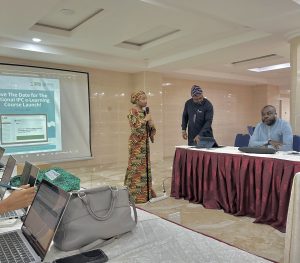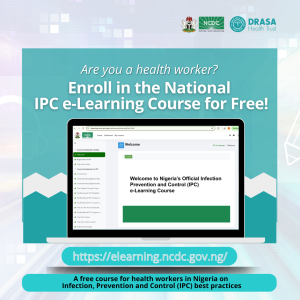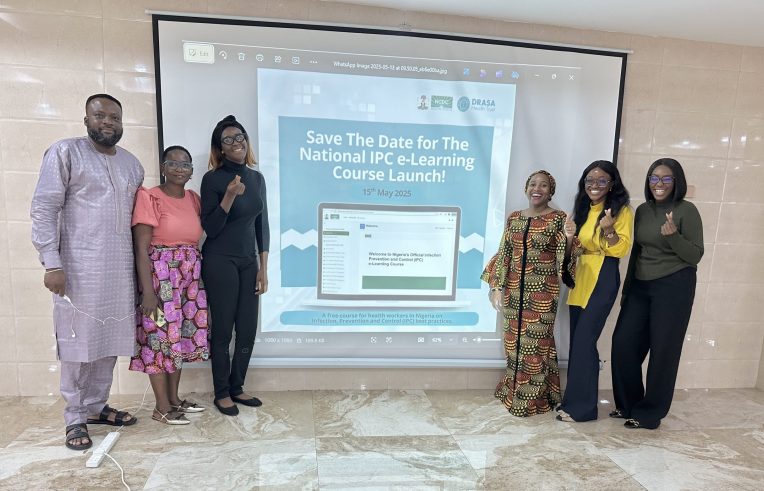In healthcare delivery, ensuring the safety of health workers and patients is paramount. Yet, without strict adherence to standard infection prevention and control (IPC) measures, this vital safety can often feel like a distant myth. IPC has been shown to prevent healthcare-associated infections (HAIs) within healthcare settings and stands as the cornerstone of a resilient health system.
In alignment with our mission to build resilient health systems—a mission deeply woven by our founding story—we remain committed to educating health workers on standard IPC practices. Our various training programs have been instrumental in delivering crucial knowledge to health workers across the country. To expand our reach and impact, we collaborated with NCDC to develop Nigeria's first IPC e-learning course. This free course is designed to educate healthcare workers on IPC best practices and fulfils the vision to empower health workers with IPC knowledge regardless of their location and cadre.
Over the last six years, the Federal Government has prioritized the national IPC program known as Turn Nigeria Orange, aimed at strengthening IPC in health facilities. These efforts have led to the development of IPC guidelines, policies, training manuals, legal frameworks, and tools, one of which is the IPC scorecard. Despite this progress, access to a nationally accepted, accessible IPC training course has remained a critical need—until now.

Bridging the Gap through DRASA and NCDC Collaboration
DRASA was engaged by the Nigeria Centre for Disease Control and Prevention (NCDC) to develop a national IPC e-learning course. Through months of stakeholder engagement, content development, and rigorous technical reviews to ensure alignment with needs and optimal functioning, we have now made the course available as self-paced modules on the NCDC website.
On May 15, 2025, Nigeria took a monumental step forward by launching its national IPC e-learning course. This innovative program is a game changer, poised to bridge the training gaps that health workers face and ensure that IPC knowledge is readily available to healthcare personnel throughout the region. More importantly, it will foster greater awareness of IPC practices across the general public. The course sets a precedent for how technology and partnerships can transform public health.

The Launch of a Virtual Learning Platform for IPC
The launch was marked by goodwill messages demonstrating strong partnerships that underpin IPC in Nigeria. Partners included the Association of Nigerian Private Medical Practitioners (ANPMP), African Field Epidemiology Network (AFENET), Centre for Infection Control and Patient Safety (CICAPS), Institute for Human Virology (IHVN), FHI360, National AIDS and STDs Control Programme (NASCP), National Biosafety Management Agency (NBMA), National Primary Health Care Development Agency (NPHCDA), National Society for Infection Control (NSIC), and United States Centers for Disease Control and Prevention (US CDC).

Dr. Tochi Okwor, Head, Disease Prevention and Health Promotion, NCDC, represented the Director General of NCDC and commended Nigeria’s IPC progress. She cited collaborations such as the one with CICAPS, the College of Medicine, University of Lagos, which equips healthcare workers with Diplomas in IPC. Acknowledging DRASA’s contributions, she stated, “DRASA went beyond the call of duty; they took it beyond the consultancy, and developed an excellent product.” She also emphasized, “The IPC e-learning course is a tapestry of everything we have done over the last couple of years as a National IPC program. It is not the usual run-of-the-mill infection prevention and control online program.”

How it works: Flexible, Accessible, Interactive
The course is a modular, self-paced, interactive course, accessible globally free of charge, only requiring internet access and registration to begin. With videos, activities, discussion sections, quizzes, infographics, and resources available for download, it provides an in-depth understanding of:
- The principles of IPC
- standard and transmission-based precautions for preventing infection transmission
- the national IPC program’s vision, progress, and milestones achieved
- guidance on establishing IPC programs in health facilities
It also introduces the Participatory Approach to Learning in Systems (PALS) method to enhance IPC practices. Upon completion of the course, participants receive a certificate if they pass the final assessment, enabling support for professional development.
Though the course was piloted and refined with a group of health workers, there is a feedback form to ensure continuous improvement of the content and format.
IPC to the World
Aligned with the National Turn Nigeria Orange strategy, the IPC e-learning course is poised to strengthen the culture of IPC in health facilities across the country. Fulfilling strategic objective 4 of the Antimicrobial Resistance National Action Plan (NAP) 2.0: Improve implementation of IPC programmes, biosecurity, and vaccination uptake, including access to WASH across the One Health sectors, the course will contribute to the reduction of antimicrobial resistance (AMR).
This launch is only the beginning. We will be developing additional advanced modules as we continue to scale access and ensure uptake of IPC at all levels of healthcare.
Do not miss this opportunity to be part of building a resilient health system for Nigeria.

Register now for the free IPC e-Learning course here: https://elearning.ncdc.gov.ng/ and watch the launch event here.




